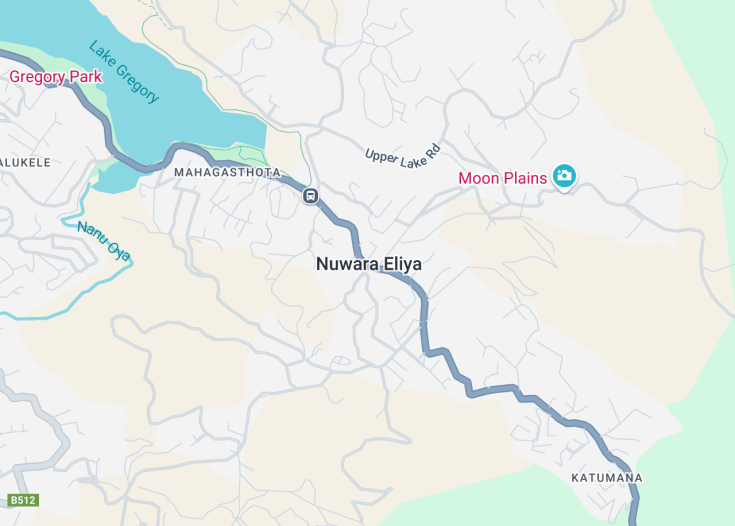Nestled amidst the verdant mountains of Sri Lanka, Nuwara Eliya is often referred to as the “Little England” of the country due to its colonial-era bungalows, well-tended hedgerows, and cool climate resembling a British spring day.
Originally established as a retreat by English tea planters, it’s now a quaint urban anomaly in a country known for its sultry subtropics. This picturesque town offers lush tea estates, serene waterfalls, and a tranquil atmosphere, making it a must-visit for those who appreciate nature, history, and a touch of old-world charm.
When visiting Nuwara Eliya, pack layers, as the climate can vary dramatically—from misty and cool mornings to sunny afternoons. Suitable clothing will enhance your experience in this unique climate.
For a truly immersive experience, plan a tea estate visit early in your trip; the guided tours provide a deep dive into the local culture and the intricacies of tea production.
Top things to do & see in Nuwara Eliya
Select the following sights and activities to discover best tickets and tours available in Nuwara Eliya.
Nuwara Eliya: A Serene Highland Haven
| Country | Sri Lanka |
| Time in Nuwara Eliya | GMT+5:30 |
| Language spoken | Sinhala, Tamil |
| Population | 27,500 (World Population Review) |
| Currency | Sri Lankan Rupee (LKR ₨) |
| Airports |
|
Nuwara Eliya, often referred to as ‘Little England’ of Sri Lanka, is nestled in the heart of the central highlands. It is renowned for its temperate, cool climate and known as the country’s primary tea production area. This picturesque town, with its colonial architecture reminiscent of a bygone era, serves as a perfect retreat from the tropical heat of the coast.
Where is Nuwara Eliya?
Nuwara Eliya is located at an elevation of 1,868 meters in the central highlands of Sri Lanka, south of Kandy.
Distances:
| Route | Distance by car | Time by car |
|---|---|---|
| Colombo to Nuwara Eliya | 180 km | 5 hours |
| Kandy to Nuwara Eliya | 76 km | 2.5 hours |
| Galle to Nuwara Eliya | 222 km | 6 hours |
What is Nuwara Eliya famous for?
Nuwara Eliya is notably famous for its lush tea plantations and the impressive Gregory Lake. It retains the charm of an English garden town, with activities ranging from golfing to exploring the picturesque Horton Plains.
History
1800s: Discovery and Early Development
The history of Nuwara Eliya, a serene locality nestled in the heart of Sri Lanka’s hill country, began in the early 19th century. Discovered by British colonial officer Sir Samuel Baker in 1846, Nuwara Eliya was originally a dense, uninhabited jungle before its potential for becoming a hill station was realized. The cool climate reminded the British of their homeland, prompting them to develop the town as a retreat from the heat of the lowlands, thus establishing a colonial sanctuary characterized by Tudor-style homes and neatly manicured gardens.
1900s: The Colonial Influence and Expansion
Throughout the early 20th century, Nuwara Eliya became an exclusive resort town popular among British civil servants and tea planters. This period saw the introduction of many of the town’s now-famous landmarks, such as the Nuwara Eliya Golf Club (established in 1889) and the Hill Club (founded in 1876). The architecture of this era, much of which remains today, is a picturesque reminder of its colonial past, featuring sprawling estates and old-fashioned bungalows.
Post-Independence: Growth and Modernization
Following Sri Lanka’s independence in 1948, Nuwara Eliya experienced gradual transformations as it adjusted to new national identities and political landscapes. The town continued to thrive as a hot-spot for tourism. Development in infrastructure and local amenities has been adapted to cater to a broader audience beyond the island’s elite, promoting inclusivity and economic growth.
21st Century: Nuwara Eliya Today
In recent years, Nuwara Eliya has seen a resurgence in its appeal as a travel destination, not just among locals but also among international tourists. Its blend of quaint colonial charm and stunning natural landscapes continues to captivate visitors. The town has expanded its offerings to include eco-tourism and adventure sports, connecting its historical legacy with modern tourist demands.
Visit Nuwara Eliya
What to see and do in Nuwara Eliya, Sri Lanka.
Discover the enchanting town of Nuwara Eliya, often referred to as “Little England.” Explore the lush tea plantations like the Pedro Tea Estate, where visitors can tour the factory and learn about tea production. Visit the pristine Hakgala Botanical Gardens, second only to Kew Gardens in London in terms of its diversity of species.
Don’t miss a leisurely stroll around Gregory Lake, or perhaps enjoy a boat ride on its tranquil waters. For those keen on adventure, Pidurutalagala, the highest mountain in Sri Lanka, provides ample hiking opportunities amidst breathtaking scenery.
- Pedro Tea Estate
- Hakgala Botanical Gardens
- Gregory Lake
- Pidurutalagala Mountain
Festive Seasons in Nuwara Eliya
Nuwara Eliya, with its colonial heritage, celebrates several annual events that attract visitors from across the globe. Notably, the Nuwara Eliya Season in April coincides with the Sinhala and Tamil New Year, transforming the town with vibrant festivities, including horse races, carnivals, and flower shows. The cool climate during this time makes it ideal for tourists looking to experience this unique cultural festivity.
Best time to visit Nuwara Eliya
The optimal time to visit Nuwara Eliya is between February and April when the weather is pleasantly cool and the flowers are in full bloom. This period precedes the monsoon season, offering clear skies and the best temperatures for outdoor activities.
is Nuwara Eliya worth visiting?
Indeed, Nuwara Eliya is absolutely worth visiting. Offering a splendid blend of historical colonial architecture and stunning natural landscapes, this unique destination caters to both history enthusiasts and nature lovers alike.
Whether it is exploring the lush green tea estates, enjoying the cool climate, or participating in rich, cultural events, Nuwara Eliya promises a memorable and enriching experience.









